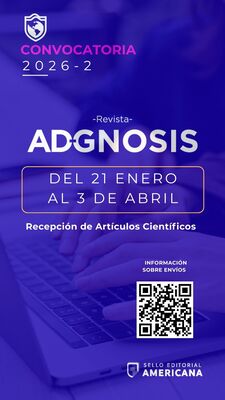Sustainable tourism strategies in the town of Palomino, department of La Guajira
DOI:
https://doi.org/10.21803/adgnosis.12.12.660Keywords:
tourism, sustainable tourism, strategies, sustainable tourism strategiesAbstract
i) Introduction: Tourism is one of the most relevant economic activities worldwide and a potential engine for the development of developing communities; ii) objective: This article aims to propose sustainable tourism strategies in the town of Palomino, department of La Guajira within the framework of economic reactivation after the covid 19 pandemic. iii)
methodology: The research is based on a study with a mixed approach and descriptive scope, where questionnaire surveys were applied to 47 hostels/hotels located in Palomino and registered with the Chamber of Commerce of La Guajira. The data were statistically analyzed in SPSS. iv) results: Among the most relevant findings, it is considered that the problem of coastal erosion, the lack of tourist infrastructure and the poor
coverage of public services are a barrier to sustainability in the territory; v) conclusions: Finally, actions are recommended to strengthen the economy, preserve identity and conserve natural and environmental resources, promote the destination, implement digital marketing strategies and enhance big data that accelerate economic recovery after the crisis generated by the COVID-19 pandemic.
Downloads
References
Aragón, J. T. (2005). Sustainable tourism days. Aragon, Spain: Government of Aragon.
Chamber of Commerce of La Guajira (2020). Registration activity database.
Decree No 055 of 2020 " Recovered from https://www.minsalud.gov.co/sites/rid/Lists/BibliotecaDigital/RIDE/DE/DIJ/decreto-0055-de-2015.pdf
Decree N 131 of May 30, 2020. Recovered from https://www.alcaldiabogota.gov.co/sisjur/normas/Norma1.jsp?i=93400
Dibulla Mayor's Office (2020) Development Plan 2020 – 2023: Dibulla is your opportunity. Recovered from https://dibullalaguajira.micolombiadigital.gov.co/sites/dibullalaguajira/content/files/000233/11637_pdm-dibulla-pdf.pdf
Fábregas-Rodado, C., Miranda-Passo, J., Londoño-Carpio, M., & Vargas-Peñaranda, M. (2023). Capacidades organizacionales requeridas en las industrias creativas del sector “hacedores del carnaval de Barranquilla”. Revista Económica, 11(2), 9-17. https://doi.org/10.54753/rve.v11i2.1681
Ledeshma, M (2016). Tourist journalism, many beginnings and some endings. 1st ed. - Autonomous City of Buenos Aires. https://www.entornoturistico.com/wp-content/uploads/2018/01/Periodismo-tur%C3%ADstico-muchos-principios-y-algunos-finales-de-Miguel-Ledhesma-PDF.pdf
UNWTO, (1994), Recommendations on tourism statistics, World Tourism Organization, Madrid.
UNWTO (2019), Panorama of international tourism, 2019 edition, UNWTO, Madrid, DOI: https://doi.org/10.18111/9789284421237.
Peralta, Leda (2022). The recovery of tourism as a pillar of the great push for sustainability. Economic Commission for Latin America and the Caribbean (ECLAC), Mexico City.
Pérez, M. (2008). Sustainable tourism manual: how to achieve social, economic and environmentally responsible tourism. Barcelona: Mundi Prensa.
Rifai, Taleb (2017). The commitment of tourism to the protection of underwater life. UN Chronicles. https://www.un.org/es/chronicle/article/el-compromiso-del-turismo-con-la-proteccion-de-la-vida-submarina
Tahiri, A.; Kovaçi, I.; Trajkovska Petkoska, A. Sustainable Tourism as a Potential for Promotion of Regional Heritage, Local Food, Traditions, and Diversity—Case of Kosovo. Sustainability 2022, 14, 12326. https://doi.org/10.3390/su141912326
Downloads
Published
Issue
Section
License
Copyright (c) 2023 AD-GNOSIS

This work is licensed under a Creative Commons Attribution-NonCommercial-NoDerivatives 4.0 International License.






